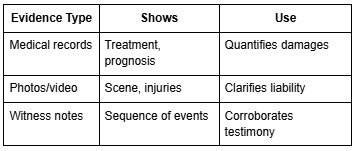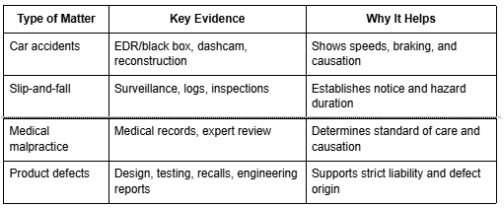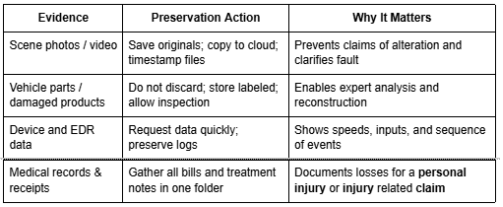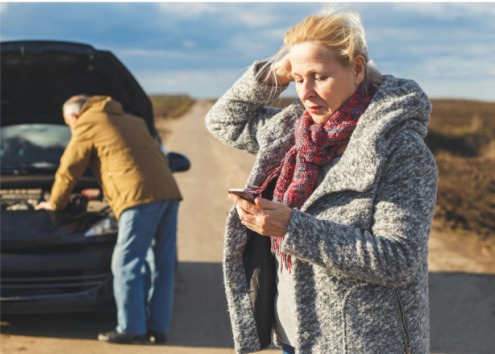One surprising fact: in Texas a first DWI can cost up to $2,000, a year without a license, and months in jail — consequences that ripple for years beyond the courtroom.
The guide shows how a single drunk-driving incident can change hiring decisions, licensing, and insurance rates. Employers often view a record as a risk, and insurers raise premiums quickly.
Texas law treats alcohol impairment seriously. For drivers under 21 the state follows a zero-tolerance rule, and administrative license actions start immediately with a 15-day window to request a hearing.
This section previews why penalties vary by state, how repeat offenses escalate fines and jail time, and why timing matters for program completion and credential renewals.
Readers will learn practical next steps: how to communicate with HR, manage background checks, and plan safe transportation while a license issue is resolved.
Understanding a DUI vs. DWI: Legal Definitions and BAC Limits
How a state defines impairment and sets a blood-alcohol ceiling shapes the penalties a driver may face. In Texas, for example, a driver is subject to a DWI charge at a 0.08% blood alcohol level or when alcohol or drugs clearly affect their ability to operate safely.
Terminology can differ: some jurisdictions call it DWI, others use different labels for the same conduct. Many states treat a first offense as a misdemeanor, while a few classify it as a civil infraction or impose mandatory jail time even on first offenders.
For drivers under 21, a strict zero-tolerance rule often applies. Limits for underage drivers commonly range from 0.00% to 0.02% BAC, and administrative license actions can begin immediately.
Authorities build cases using breath, blood, and field observations. When chemical results are unavailable or refused, documented signs of intoxication and officer notes may suffice to support charges and early license suspension.
- Per se laws set numeric BAC limits.
- Observable impairment can substitute for test results.
- Even first-time offenses can harm employment, insurance, and schooling.
Immediate Consequences After Arrest and Conviction
Within hours of an arrest, a driver may face both courtroom penalties and separate administrative actions that run alongside each other.
Criminal penalties: fines, jail time, and probation
Court outcomes vary by state and past offenses. In Texas a first dwi can carry fines up to $2,000 and 3–180 days in jail.
Repeat cases bring stiffer penalties, longer jail terms, and higher fines. Judges often add probation and a required sentence that sets strict deadlines.
Administrative actions: license confiscation and suspension
Administrative License Revocation (ALR) moves quickly. A temporary license may be taken at arrest, and a formal suspension can start unless the driver files for a hearing within 15 days.
Administrative steps are separate from the criminal case and can limit mobility long before any court ruling.
Mandatory education, treatment programs, and community service
Courts commonly order alcohol education or treatment, plus community service hours and supervision. These programs carry costs and fixed timelines.
Missing required classes or a check-in for intoxication monitoring can trigger extended supervision or new penalties. Early planning—arranging rides and documenting progress—helps when meeting sentence terms.
- Quick facts: administrative and court tracks run at the same time.
- Expect added costs for classes, supervision, and lost driving time.
- Compliance with education and community programs reduces the risk of harsher outcomes.
A skilled DUI lawyer Colorado like Shazam Kianpour understands the state’s strict laws and can build a strong defense.
License Suspension, ALR Hearings, and Restricted Driving Options
A short administrative timeline often decides whether someone keeps limited driving access or faces an automatic loss of privileges. After an arrest, administrative procedures run separately from the criminal case and can move quickly.
Administrative License Revocation starts a critical window. In Texas, a driver has 15 days to request an ALR hearing. If that request is missed, an automatic license suspension may take effect.
Hearing timelines and practical steps
Request the hearing right away and gather evidence: proof of employment, schedules, and witness notes. Scheduling the hearing early gives time to present why a restricted license is needed.
Occupational licenses and ignition interlock rules
Courts often grant occupational or restricted licenses so a driver can get to work, school, or medical care. Judges may require an ignition interlock or IID as a condition.
- First-offense suspensions commonly begin near 90 days in many states.
- Installing an interlock device is usually at the driver’s expense and must be maintained per vendor instructions.
- Missing required days of monitoring, driving outside permitted hours, or failing paperwork can add penalties.
Check insurance and employer policy early if driving is part of the job. Strict compliance with device rules and hearing deadlines reduces the risk of longer suspension or extra penalties under dwi laws.
Penalties by Offense Level: First Offense to Felony DUI
Each repeated offense brings tougher fines, longer suspensions, and higher risk of felony charges. The law treats a first offense very differently than later cases, so understanding the tiers helps a driver plan next steps.
First offense: typical outcomes
First offense often remains a misdemeanor in many states. Typical penalties include short jail time, fines, and a set license suspension tied to measured BAC or proof of impairment.
Second offense: stronger penalties
A second offense brings enhanced penalties, longer license suspension, and closer supervision. Courts may require an ignition interlock device and longer monitoring after repeat dwi matters.
Third or subsequent: felony exposure
By the third incident, many jurisdictions move to felony charges. Prison ranges can extend for years, fines rise substantially, and long-term barriers to employment and licensing follow.
- Example (Texas): first—up to $2,000 and 3–180 days jail; second—up to $4,000 and 30 days–1 year jail; third—up to $10,000 and 2–10 years prison.
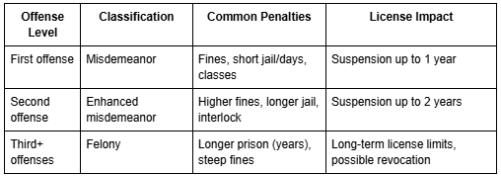
Enhanced Penalties and Aggravating Factors You May Face
Certain facts—like a very high blood alcohol level or a child in the car—can sharply raise the stakes in a traffic-related criminal case. States add enhanced penalties for clear aggravators to deter risky conduct and protect the public.
High BAC, test refusal, and open container rules
Many states treat a BAC at or above 0.15% as an aggravator. That can mean longer license suspension, mandatory ignition interlock, and steeper fines.
Refusing a chemical test often triggers automatic administrative action. An open container inside a vehicle may add separate policy violations even without observed impairment.
Accidents, injury or death, and child passenger consequences
Crashes that cause injury or death often upgrade charges to felony counts. In Texas, intoxication assault or manslaughter can bring prison time and long-term limits on driving.
Transporting a child under 15 can lead to child endangerment charges, extra jail exposure, and added license loss. These aggravators change how prosecutors view plea options and sentencing.
- Quick take: high blood readings, test refusals, crashes, and child passengers commonly add penalties and complicate defenses.
- Early mitigation—documented treatment, safe-transport plans, and prompt legal advice—helps when facing enhanced penalties and tighter supervision.
Ignition Interlock Device (IID): What It Is, When It’s Required, and Costs
An ignition interlock acts like a checkpoint on your dashboard — the car won’t start without a clean breath sample. It requires the driver to blow into an approved unit before ignition and may demand rolling retests while driving. Devices log results and send reports to courts or agencies.
How the device works and state rules
How it works: the unit measures alcohol on breath and prevents ignition above a set limit. Many states require an ignition interlock after repeat dwi matters, high BAC readings, or as a condition for a restricted license.
Installation, monitoring, and common mistakes
Drivers usually pay installation, monthly service, calibration, and removal fees. Missed service visits or ignored lockouts often extend required days of use.
- Schedule calibrations on time and keep receipts.
- Avoid alcohol-containing products that cause false positives.
- Report malfunctions promptly to the vendor and court.
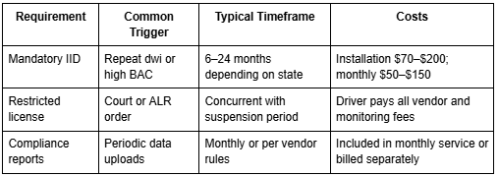
DUI Conviction Collateral Consequences: Career, Insurance, and More
A recorded alcohol-related offense can ripple into work, insurance, and travel long after court orders end. Consequences often last for years and may affect hiring, licensing, and financial stability.
Employment and professional licenses
Background checks commonly reveal recent charges and convictions. Employers may restrict driving duties or deny roles that require a clean record.
Professional boards may ask for disclosure and proof of program completion when reviewing license renewals.
Auto insurance and SR-22
Insurers reclassify risk after a dwi. That can lead to higher premiums, loss of discounts, or policy cancellation.
Some drivers must file an SR-22 or buy high-risk coverage for specific days or years to regain standard rates.
Education, housing, and travel
Colleges and landlords may consider recent legal issues in decisions about scholarships, campus standing, or applications.
International travel and visa screening can be affected when an applicant has alcohol-related penalties on record.
- Tell HR early and provide proof of completed programs.
- Compare specialty insurers and ask about SR-22 timelines.
- Plan time for classes and community service to keep work attendance steady.

Under 21 and Zero Tolerance: Special Rules for Young Drivers
Young drivers face stricter rules: even a trace of alcohol can trigger formal actions and paperwork. Texas enforces zero tolerance, and most states set under-21 blood alcohol thresholds at 0.00%–0.02%.
Any measurable BAC can start an administrative license process. That often leads to a prompt hearing deadline and possible license suspension while matters move forward.
Lower limits, education, and quick suspensions
First offenses for drivers under 21 frequently carry mandatory education, short suspensions, and strict timelines measured in days. Schools may add conduct reviews that affect scholarships and campus status.
- Arrange safe rides and document attendance for required education.
- Meet hearing deadlines and keep proof of program completion.
- Families should gather records to show compliance for employers or schools.
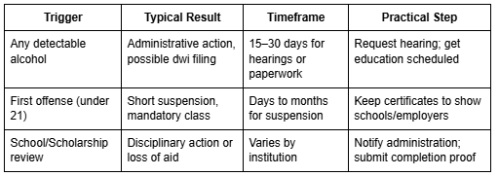
How to Move Forward After a DUI Conviction
A focused timeline makes it easier to meet program rules and protect job access while the case resolves. Start by listing court dates, class schedules, and any required service hours. Many states allow restricted driving with an ignition interlock during a suspension, so check local laws quickly.
Complying with sentences: timelines, community service, and program completion
Build a calendar that notes time windows and specific days for classes, evaluations, and community service. Prioritize employer-critical hours and arrange rides when the driver cannot legally drive.
Keep copies of receipts, enrollment confirmations, and IID installation records. Meeting each sentence term on time reduces the risk of added penalties and helps when requesting occupational licenses or ALR hearings.
Documenting progress: mitigating future consequences and rebuilding trust
Track attendance, collect completion certificates, and get supervisor letters for service work. Maintain a short case journal with dates, contacts, and proof of completion to show consistent responsibility.
Use education and counseling to show growth; this evidence may face scrutiny in later cases but often helps with job interviews and licensing reviews. Reconnect with local community supports to rebuild credibility.
- Quick checklist: calendar, receipts, certificates, IID logs, and supervisor notes.
- Communicate early with probation and HR; transparency and documentation matter.

Conclusion
A dwi can bring immediate steps and long-tail consequences. Beyond fines and jail time, drivers face license suspension, higher insurance, and work impacts that may last for years.
State laws differ, so careful attention to field sobriety results, chemical testing, and deadlines matters. Acting fast—requesting hearings, arranging safe transport, and starting required classes—can limit disruption.
While prison is usually reserved for serious or repeat cases, even a first offense creates steep costs and time demands. Document payments, certificates, and IID records to help with future licensing, job checks, and school reviews.
Takeaway: prioritize safety, use alternative transport, and lean on support systems to protect work, family, and the future.
FAQ
How can a driving while intoxicated finding affect a person’s career and future?
A court finding for driving while intoxicated can harm job prospects, especially in roles that require driving or a professional license. Employers often run background checks and may deny positions in transportation, healthcare, education, or finance. Licensing boards can impose restrictions or revocations, and some security clearances or federal jobs become harder to obtain. Rebuilding trust takes time, consistent compliance with court orders, and documentation of rehabilitation or treatment.
What is the difference between driving under the influence and driving while intoxicated, and what are typical blood alcohol limits?
Terminology varies by state: some use “driving under the influence” while others use “driving while intoxicated,” but both refer to impaired driving. Common blood alcohol concentration (BAC) limits are 0.08% for drivers 21 and older and 0.04% to 0.05% for commercial drivers. Drivers under 21 usually face zero-tolerance limits, often 0.01% to 0.02% BAC. State statutes define exact thresholds and related penalties.
What immediate criminal penalties might someone face after an arrest for impaired driving?
Criminal penalties can include fines, probation, mandatory alcohol education, community service, and jail or prison time for severe or repeat offenses. Sentences depend on prior records, BAC level, whether an accident occurred, and local laws. Courts may also require substance abuse assessments and enrollment in treatment programs.
What administrative actions can follow an impaired driving arrest, and how do they affect driving privileges?
Administrative actions often include license seizure, suspension, or administrative license revocation (ALR). States may impose immediate short-term holds and schedule hearings where the driver can challenge suspension. These measures act separately from criminal cases and can restrict driving long before court resolution.
Are education, treatment programs, or community service commonly required after a case for impaired driving?
Yes. Courts frequently order alcohol education classes, substance abuse treatment, ignition interlock installation, and community service. Completion often conditions reinstatement of driving privileges and can reduce other penalties. Program lengths vary by offense level and state rules.
What is the timeline for Administrative License Revocation and the importance of the 15-day window?
Many states require drivers to request an ALR or implied-consent hearing within a short window—commonly 7 to 15 days—after license seizure to challenge suspension. Missing that deadline usually means automatic suspension. It’s critical to act quickly and consult local rules or an attorney to preserve hearing rights.
What are occupational or restricted licenses, and when is an ignition interlock device required?
Occupational or restricted licenses permit driving for work, school, or essential duties during suspension periods. Courts or motor vehicle agencies often require installation of an ignition interlock device (IID) as a condition. IIDs prevent a vehicle from starting if the driver’s breath alcohol exceeds a set limit and are common for reinstatement after offenses.
How do penalties escalate from a first offense to a felony level?
A first offense typically yields misdemeanor penalties: fines, short jail terms, driver’s license suspension, and program requirements. A second offense brings heavier fines, longer suspensions, mandatory interlock devices, and increased jail exposure. Third or subsequent offenses, or cases involving serious injury or very high BACs, can elevate the charge to a felony with prison time, longer license loss, and long-term repercussions.
What aggravating factors lead to enhanced penalties?
Enhanced penalties apply for very high BAC readings, refusal of chemical tests, driving with a suspended license, having a minor in the vehicle, or causing injury or death. These factors increase fines, jail or prison exposure, and chances of felony charges. Courts and prosecutors treat such circumstances more severely.
How does an ignition interlock device work and what are common state requirements?
An IID requires the driver to provide a breath sample before the engine starts. If the test shows alcohol above the set threshold, the vehicle won’t start. Devices also require periodic rolling retests while driving. States differ on mandatory IID periods, installation providers, and payment of costs, which may include installation, monthly calibration, and removal fees.
What are typical compliance mistakes with interlock devices?
Common mistakes include missed calibration appointments, attempting to have another person blow into the device, failing rolling tests, and ignoring service notifications. Violations can extend the required IID period, trigger reinstatement delays, or lead to additional penalties.
How does a finding for impaired driving affect auto insurance and SR-22 requirements?
Insurance companies often treat offenders as high-risk, raising premiums substantially or canceling coverage. Many states require SR-22 or FR-44 filings to prove financial responsibility before regaining driving rights. These filings increase costs and remain on records for several years.
Can an impaired driving record affect employment, education, housing, or travel?
Yes. Employers may deny jobs or revoke offers after background checks, and professional licensing boards can discipline or refuse licenses. Colleges and scholarship programs may consider conduct violations. Some countries restrict entry for those with certain offenses, affecting travel and immigration prospects.
What special rules apply to drivers under 21 and zero-tolerance policies?
Under-21 drivers typically face much lower BAC limits and stricter penalties. States use zero-tolerance laws that can trigger immediate suspension, mandatory education, and longer monitoring. Even small alcohol amounts can lead to license loss and long-term record impacts for young drivers.
After a finding for impaired driving, what steps should a person take to move forward?
They should comply fully with court orders, complete all required education and treatment, install an IID when ordered, and keep clear records of compliance. Seeking legal advice, maintaining steady employment, and documenting rehabilitation efforts help mitigate future consequences and support opportunities for license reinstatement and record relief where available.


